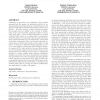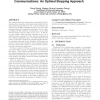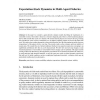36 search results - page 7 / 8 » Convergence to Equilibrium in Local Interaction Games |
ATAL
2007
Springer
13 years 12 months ago
2007
Springer
Classically, an approach to the multiagent policy learning supposed that the agents, via interactions and/or by using preliminary knowledge about the reward functions of all playe...
JSAC
2007
13 years 5 months ago
2007
— One of the distinctive features in a wireless ad hoc network is lack of any central controller or single point of authority, in which each node/link then makes its own decision...
MOBIHOC
2007
ACM
14 years 5 months ago
2007
ACM
We consider distributed opportunistic scheduling (DOS) in wireless ad-hoc networks, where many links contend for the same channel using random access. In such networks, distribute...
ANOR
2005
13 years 5 months ago
2005
In this paper we consider a game-theoretic dynamic model describing the exploitation of a renewable resource. Our model is based on a Cournot oligopoly game where n profit-maximizi...
SIAMCO
2010
13 years 4 months ago
2010
We consider linear-quadratic-Gaussian (LQG) games with a major player and a large number of minor players. The major player has a significant influence on others. The minor playe...




